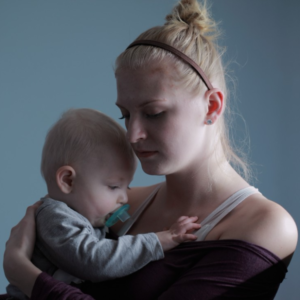Learn more about post-partum depression
 Post-partum depression can be immobilizing. It isn’t just about hormone imbalances. The reality is that birth mothers, surrogate mothers, and women who become mothers through surrogacy and adoption may experience post-partum depression. In this article I will:
Post-partum depression can be immobilizing. It isn’t just about hormone imbalances. The reality is that birth mothers, surrogate mothers, and women who become mothers through surrogacy and adoption may experience post-partum depression. In this article I will:
- Define post-partum depression
- Explain the symptoms to look for
- Offer suggestions for relief
Beyond Female Hormones: Causes of post-partum depression
Believe it or not, even the happiest, most well-adjusted of birth mothers, surrogates, or any new mother can experience depression. Women may experience it even if they’ve never had it before, and the condition can impact everyone around them, especially their baby.
All women who become mothers, whether they give birth or not, can show signs of these post-partum conditions for up to 12 months after the baby is born. This is true for women who suffer miscarriages or stillbirth. Studies show that men may also experience post-partum depression. Here are the causes of post-partum depression:
- Physical changes: hormones play a big role. Some hormones drop and others increase which can make you feel tired, depressed and anxious.
- Emotional issues: sleep deprivation plays a big role and can lead to anxiety. Feelings of loss of control, low self-esteem, and changed identity can be overwhelming.
You might feel symptoms of depression simply because you are unsure of how to parent. Maybe you are wondering if you are doing it right. The hype and excitement of being a parent might shift to concerns about whether you will actually be a good parent.
Signs of Post-Partum Depression
Post-partum depression is not the same as “baby blues.” The baby blues tend to last only a few  days or a week or so after the baby is born. The signs of post-partum depression may be subtle. Frequently, a friend or loved one will notice signs first. Common symptoms include:
days or a week or so after the baby is born. The signs of post-partum depression may be subtle. Frequently, a friend or loved one will notice signs first. Common symptoms include:
- Depression and severe mood swings
- Excessive crying
- Insomnia or sleeping too much
- Loss of appetite or eating too much
- Intense irritability and/or anxiety
- Difficulty bonding with the baby
- Withdrawal from family and friends
- Thoughts of harming yourself or your baby
If you know someone who might be suffering from post-partum depression. Speak up! Let your friend or loved one know what you are observing. Many women don’t realize they might be suffering from a condition and that relief is available.
You might need professional help
Don’t be afraid to talk with your doctor about post-partum depression. It is a common condition and very treatable. You should see a doctor if any of the following apply to your symptoms:
- They don’t go away after a week or two
- You aren’t able to care for yourself or your baby
- You are having thoughts of harming yourself or your baby
Your doctor may recommend counseling, diet changes, or possibly medication or dietary supplements like turmeric. Tell a trusted friend or family member if you are diagnosed with post-partum depression. Ask them to keep an eye on your mood and potential symptoms. Some women don’t notice when they are suffering and don’t want to ask for help. Remember you aren’t alone, and help isn’t far away. Seeking support and medical treatment is the best thing you can do for yourself, your baby, and your family.
